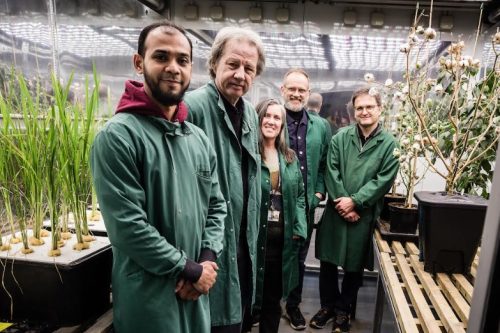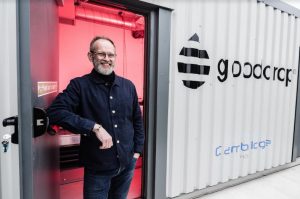Start-up aims to disrupt global cotton farming market

Hull-based agritech start-up Gooddrop is on a mission to establish itself as a global player in the vertical farming of cotton.
It has begun with an initial £1m investment and a three-year research partnership.
CEO Simon Wardle said: “We have founded Gooddrop to provide the retail sector with an entirely manageable solution to issues of sustainability in cotton farming.
“Our ambition is to enable the transformation of cotton production from field to indoor farming, producing a sustainable, profitable crop that can be fully utilised by agriculture, manufacturing and retail.”

Simon Wardle
Launched and backed by a partnership of Wardle and Andres Perea, Gooddrop’s £1m launch investment will ensure its initial costs are met, including for research, manpower and capital expenditure.
Wardle added: “We will continue to invest in Gooddrop while encouraging private equity, including angel and venture capital, and local, regional and national funding bodies to invest in the business.”
The business’s main research partner is the University of Nottingham, which has the largest group of internationally recognised plant and crop scientists in the UK university sector.
Central to the research programme with the university has been the design, build, fitout and installation of six custom-made cotton research units.
These research, test growing labs and admin units have been manufactured by Cambridge HOK at Newport, East Yorkshire, then transported to and installed at the University of Nottingham’s Sutton Bonington Campus in Leicestershire.
The research units will inform the final design criteria for the scale-up of an indoor cotton farm, which Gooddrop will design and construct using data from the first micro-farm cotton harvest over the next two to three years.
The business explains that by growing cotton indoors, it can protect the plants from weather, pests and disease without the need for chemicals or excessive water.
Erik Murchie, Professor of Applied Plant Physiology, School of Biosciences at the University of Nottingham, said: “The idea here is to develop vertical farming concepts for cotton which is normally a field crop.
“This includes making the cotton more sustainable and to reduce inputs into cotton production and to develop means of growing it indoors. This will allow us to control temperature and humidity and light quality.”
John Foulkes, Associate Professor in Crop Science, said: “The added value of this new unit is significant as it will allow us to manipulate the growing conditions of the cotton, manipulate the light and its wavelength in unique ways, to increase the water use efficiency, reducing the inputs and uptakes required to grow the cotton.”
Wardle said he is committed to alleviating problems inherent in modern day cotton farming and retail cotton use.
“Infield cotton is not only extremely bad for the environment, the production of infield cotton is also problematic and in some cases, unethical when it comes to human rights,” he said.

Simon Wardle with one of the new research units
“As one of the most destructive crops on the planet, water consumption is a massive issue for cotton with large tracts of land left arid and unable to support growing.
“With about 2.6% of the planet’s freshwater being used to grow the global supply of cotton, around 7,000 – 10,000 litres per single kilogram of cotton grown, and knowing that cotton grown the Gooddrop way should use around 95% less water than currently consumed for cotton typically grown in irrigated fields, we knew it was time to scale up and make the change.
“Gooddrop’s vertical farming will also significantly reduce the amount of land used for growing cotton while increasing yield so cotton grown the Gooddrop way would use less than 0.4% of the land currently used.
“We believe we have the potential to be the global cotton market disruptor.”








